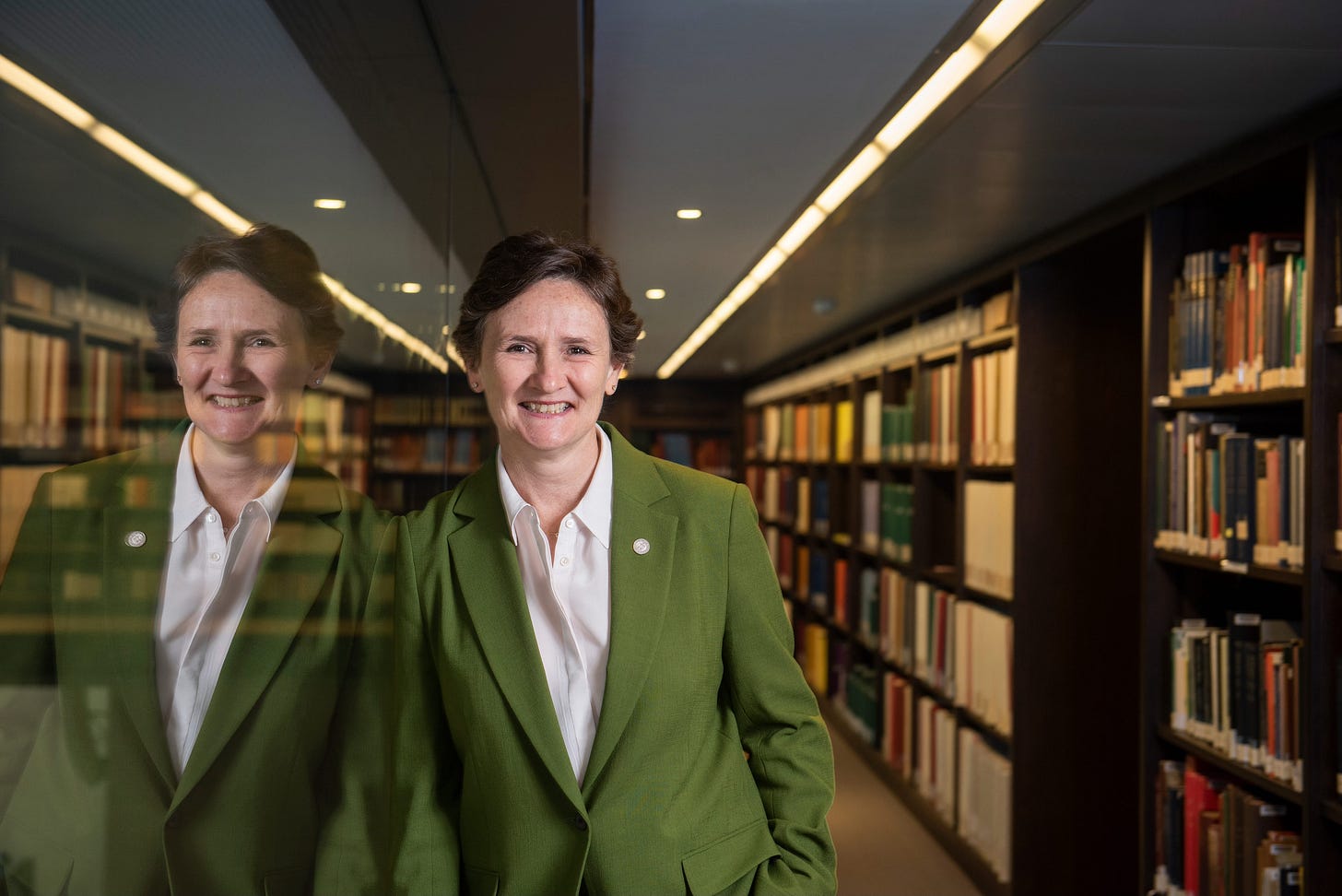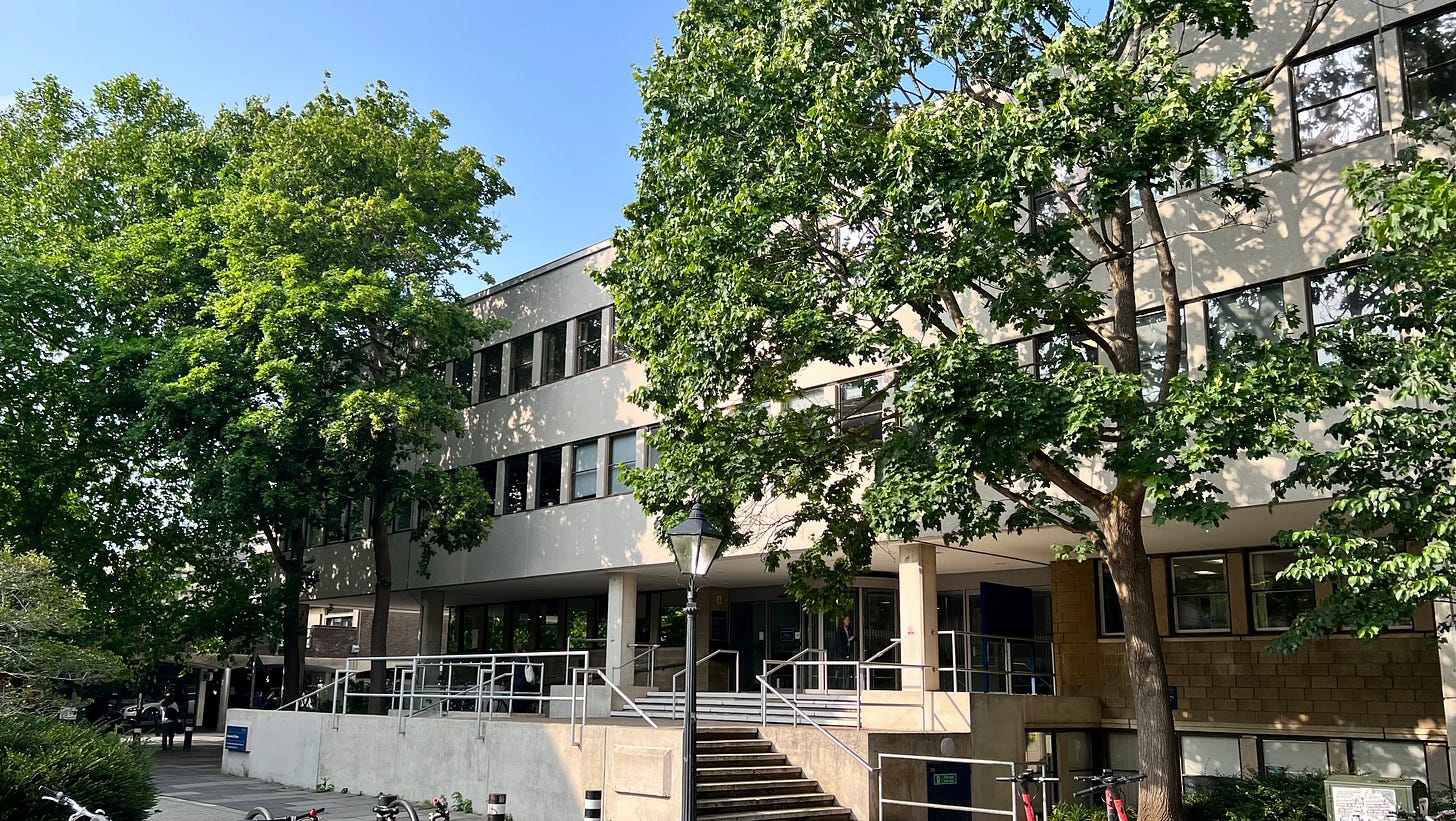In conversation with Oxford's Vice-Chancellor, Irene Tracey
When it comes to the US, "we're looking at what not to do, and making sure we try and do it a bit better," says Professor Irene Tracey.
Welcome!
Hello and welcome to The Student Eye, a weekly publication for university students and those interested in higher education across the UK.
This week, we bring you an exclusive interview with the Vice-Chancellor of the University of Oxford, Professor Irene Tracey. In an era of innovation for universities, Tracey tells The Student Eye about the importance of combining local and national strategy when it comes to driving growth, the limitations of looking to the United States, and the untapped potential of spin-out companies.
We hope you enjoy this week’s edition of The Student Eye, and please share with anyone who may be interested!
“It's got momentum in a way we've not had before”: Professor Irene Tracey on rebooting the Oxford-Cambridge Arc
By Amelia Gibbins and Oliver Hall
When the Oxford-Cambridge Arc was announced in the 2017 Autumn Budget, hopes for a post-Brexit centre of growth were high. Instead, stagnation ensued. Now, months on from an announcement to reboot those plans, Oxford’s Vice-Chancellor is certainly in good spirits. “The mood music seems very, very positive”, she says, “It feels like it's got momentum, focus and backing in a way we've not had before.”
Since taking on the role of Vice-Chancellor two years ago, Tracey has been a player in the national conversation around the role of universities in generating growth and innovation, and co-authored the government’s Independent Review of University Spin-out Companies in 2023. This seems to have been echoed in all the right places as in January this year, when Chancellor Rachel Reeves breathed new life into plans for the Oxford-Cambridge Growth Corridor.
However, there has been quiet criticism levelled at the government for focusing higher education growth in the South, particularly around London. Tracey acknowledges this, but points out that, “two of the top five universities in the world happen to be Oxford and Cambridge, and we've just been at it a bit longer. Therefore, you sweat the two assets you've got.” If the Oxbridge “pilot” performs well, that same model can be mirrored in other parts of the country, Tracey hopes.
While other areas of the UK will be looking to Oxford for inspiration, Oxford has been looking across the pond. The higher education model in the United States is dramatically different, with institutions receiving vastly larger sums of money in endowments and tuition fees. That, combined with a more established spin-out culture, has meant that universities such as Stanford and Harvard can recoup more funds than comparable UK institutions. Tracey believes that the general economic picture plays a role here too.
“Two of the top five universities in the world happen to be Oxford and Cambridge, and we've just been at it a bit longer. Therefore, you sweat the two assets you've got.”
“It's a problem that most of the capital coming in is generally from a US investor and of course, they're very interested in the companies moving to the US,” she says. “I'm running a university that's bolted onto my beautiful hometown of Oxford, but I'm competing with universities bolted onto San Francisco, Manhattan and Boston. They're very different cities with a very different talent base to work in these companies.”
“The thing I find most frustrating is not being able to hold on to all the companies that we've spun out and grown. They should be staying in Britain and growing here.” She says, “Of course I want them to succeed, but wouldn't it be great if they could succeed here just as much as they could by moving to Boston or San Francisco? That's what Britain has to do. We just have to be able to give them a counter offer to make it as attractive to stay here as it is to go there. And right now, we haven't got that right.”
Indeed, American institutions are far ahead of the game on spin-outs, and UK universities are only now starting to see that potential. Even as a young scientist, Tracey had noticed that Brits “weren't always realising the benefits of intellectual property,” which would be taken to the US, where companies were made and IP could be more easily spun out.
“The thing I find most frustrating is not being able to hold on to all the companies that we've spun out and grown. They should be staying in Britain and growing here. Of course I want them to succeed, but wouldn't it be great if they could succeed here just as much as they could by moving to Boston or San Francisco?”
The Vice-Chancellor has spoken to the potential that she sees in spin-out companies to bolster local and national economies. Since 2011, Oxford University has created 225 spin-out companies, ranking highest in the UK, and in 2022 alone, Oxford spin-outs raised £956 million in external investment, an estimated 45% of the £2.13 billion across the UK.
Tracey is bullish with her predictions for the success of the Arc, believing that projections of a £78 billion economic boost by 2035 are even conservative. She explains, “if you just look at what Oxford and Cambridge contribute regionally to the country, we're already at £34 billion, and we haven't even really started. If you connect it up, I would say that at a minimum, we would get to that level quite quickly, and if things went well, I'd be more ambitious.”
Grand plans of uniting two “global brands” are exciting to those directly involved in science and innovation. However, in the past, local communities have been understandably hesitant to embrace this change, given the burden that accommodating major universities can have on neighbouring people. In the UK, Oxford and Cambridge are the most expensive cities outside London to buy a house, and environmental groups have previously sounded the alarm bells over infrastructure plans.
“When it comes to the infrastructure that means that your quality of life isn't impacted, frankly, we haven't done that very well.”
Oxford’s Vice-Chancellor represents both town and gown, having attended a state comprehensive in the county and now speaking for the University on the global stage. On the University’s duty to make the city and its surrounding areas comfortable for residents, Tracey admits that the University must get more involved in some of the infrastructure solutions. If local people are to reap the benefits of this innovation, for Tracey, the University will have to make those infrastructure plans a priority.
It is also true, of course, that many American university towns have experienced real tensions between universities and local populations. In 2022, the University of California, Berkeley, was forced to halt their expansion plans and cap student numbers as a result of a ruling from the Supreme Court of California. Many other towns and cities have experienced similar problems and recently set out plans to change their approaches. As a result, when it comes to the States, Tracey admits that in many ways, “we're looking at what not to do, and making sure we try and do it a bit better.”
The public perception of this expansion is crucial at this stage, especially given the past delays to these plans. Tracey points out that when politicians talk about growth, “the psychology is that it’s bad, because when we have generally grown, often we just made the traffic worse, we've made it more difficult to get your kids into school, and it takes longer to get to your GP. She admits that “when it comes to the infrastructure that means that your quality of life isn't impacted, frankly, we haven't done that very well.”
“If we don't meet the ability to actually build at scale, to be able to house people that want to work in these companies, to have decent water provision and sewage, none of that is going to happen.”
These comments speak to an interesting mismatch between how the public view ‘growth’ in opinion polls, and the central role that it plays in almost every government plan. Indeed, last year’s general election was won in record-breaking style with ‘growth’ at the front and centre of economic policy. The role that universities already play in that picture is relatively clear, but going forward, their influence will need to be even more significant.
The solution, for Tracey, is to involve local people as much as possible. She speaks glowingly of the role that the Oxford Growth Commission has to play in suring up local infrastructure, and praises the appointment of Neale Coleman as Chair. In terms of the role of government in her grand designs, then, she says that Oxford can keep generating IP, but “if we don't meet the ability to actually build at scale, to be able to house people that want to work in these companies, to have decent water provision and sewage, none of that is going to happen.”
Though Tracey’s vision of her university as a superpower for innovation and growth comes through with force, she is prepared to admit that without government backing, none of this would be possible. She talks to the government about the need to speed up bureaucracy as, at the end of the day, “you're not going to be competitive if you're waiting three years to get planning permission.”
For Tracey, universities like her own are well-poised to drive economic growth, but only if the foundations are laid correctly. IP may well be in abundant supply, but what is needed now is the infrastructure and the sustained political will to match it.
Around the country
Each week, we bring you a selection of our favourite stories from student publications around the UK.
Oxford University discipline statute retains ‘problematic clauses’ despite year-long consultation
Amelia reports for Cherwell that following last year’s backlash over “illiberal” and “alarming” updates to Oxford’s code of discipline, the University have now released updated proposals to their statutes. However, the opponents of last year’s amendments have described the “chilling effect” that certain claues could have towards freedom of expression, peaceful assembly, and academic freedom, as well as claiming that the process to address concerns was undermined by the University.
Imperial graduand dragged out from ceremony after protesting for Palestine
Felix at Imperial College London report on recent protests at graduation ceremonies, with posts circulating on social media of one graduand being removed for holding up a sign. A previous protest had occurred outside the Royal Albert Hall on the 2nd June as Imperial Business School held its graduation ceremony.
Cambridge students oppose exhibition dedicated to eugenics professor’s book
Varsity report on members of the Gonville and Caius Students Union expressing concerns over the College’s plans to hold an exhibition celebrating the work of the controversial statistician and eugenicist Sir Ronald Fisher. While an undergraduate at Cambridge, Fisher became a founding member of the University of Cambridge Eugenics Society, and was also the Galton Professor of Eugenics at University College London for ten years.







Great job landing an interview with the VC! An interesting read as always.
Always a good read, the issues substantial and worthy of analysis. Bernard H